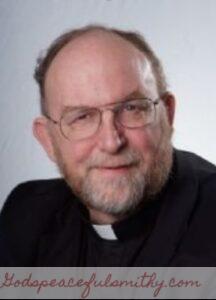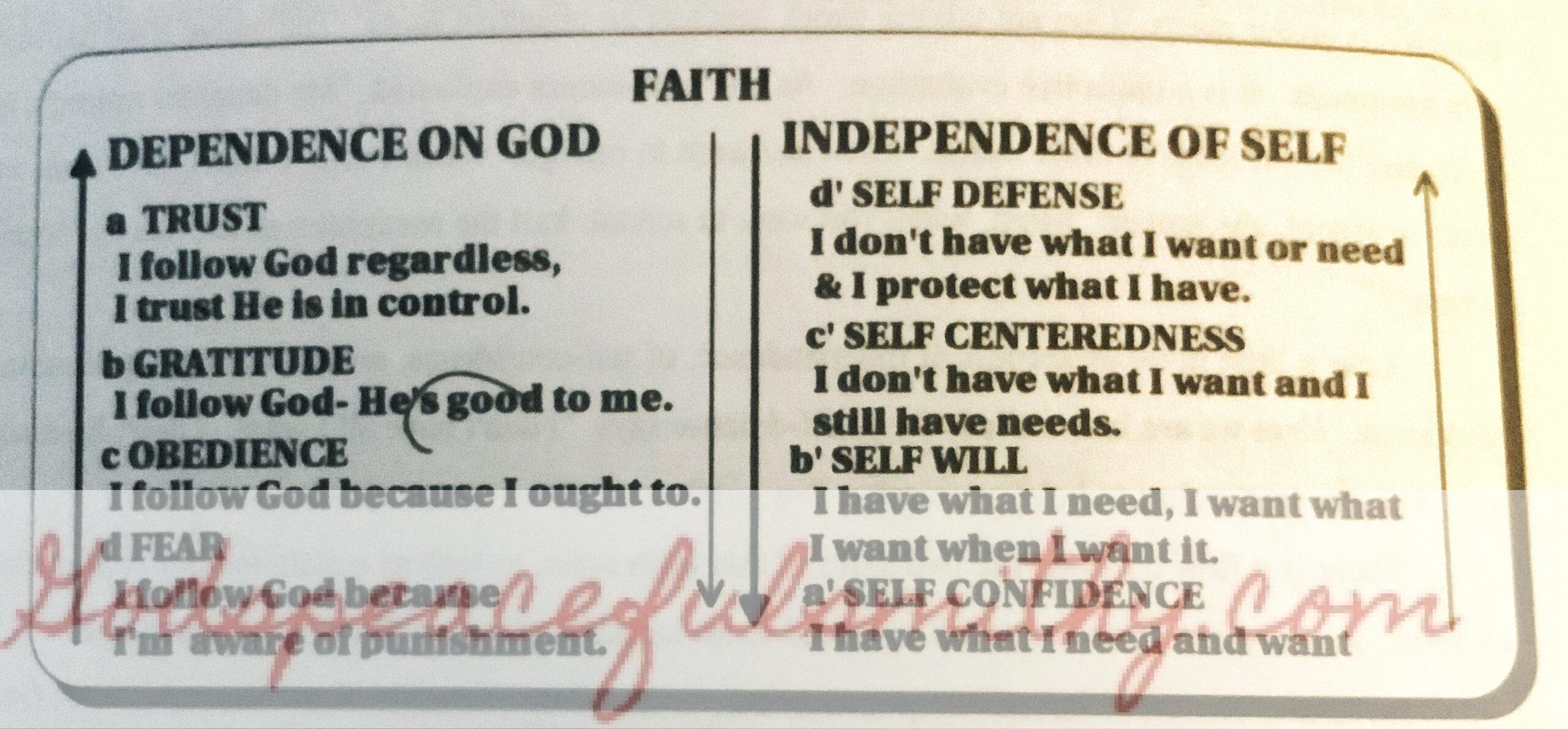
The Religious Mode is the first of four Christian modes. I developed these following Walter Lowen’s concepts of entropy. The Religious Mode is derived from the dynamic relationship between dependence upon God and independence of self. The Security Mode emerges from the dynamic relationship between awareness of imperfection in self and the response to hurt from others. The Judgment Mode is likewise the result of the relationship between a response to the awareness of God, and a response to the awareness of sin. The justification mode flows from the relationship between an awareness of order and awareness of choice.  To begin, let us look at a scale of increasing entropy with regard to dependence upon God. At the top with the least amount of entropy is trust. In trust we live our lives, and follow God because we are confident that God is in control. Regardless of past or present conditions. Gratitude is next. A slight degree of entropy sets in, as we move from trust to Gratitude. We follow God, because we are grateful for what he has done in the past. He is the creator, the Redeemer, and helper in our lives. However, if something something doesn’t go the way we want, or like, we may change our minds. Our discipleship, our following of God’s way, is threatened. Obedience is next lower on our entropy scale. Without trust or gratitude, we simply follow God’s way, because somehow we have learned that we should. We are driven by ought and should. It is a joyless kind of discipleship and vulnerable to Temptations. Fear is last. When even obedience slips away. We are only left with our fear of negative consequences. We follow God, because if we don’t, ‘There will be hell to pay.” On the other side of the entropy scale is our sense of independence. We are examining our level of confidence. At the top of the scale (bottom right of the chart) is self-confidence. This can be expressed as an attitude which says “I have what I need and what I want. I have my resources. I have my abilities. I am self-confident.” With a little entropy settling in, we move to self-will. The focus here is on want. I may have what I need but there is a minus in the equation. My wants are lacking. In self-will I say, “I want what I want when I want it.” Below self will, and moving towards chaos, comes self-centeredness. Now our focus and our attention is on our needs. I’m not talking about needs in an objective sense. The whole scale has to do with awareness. It is a subjective evaluation. As one parishioner explained, “When my daughter needed a hairdryer and two carloads of other things when she went to college I said, “I didn’t have them when I went to school she replied Mom, when you went to school half the necessities of life had not been invented!” Lose a little more awareness of independence, of self-confidence, and the entropy scale moves to self-defense. Here we are in a walled city. Self-defense says ‘I don’t have all I want. I don’t have all I need. And I’m sure going to hold on to what I’ve got.” There is a flow between the two sides of the faith scale, as well as a dichotomous relationship at each level. An increase in trust in God will lead to an increase in self-confidence. The move from self-defense to self-centeredness can help us move from fear to obedience in a relationship with God. Here there are levels of development. As Kohlberg and others suggest, but these levels are more fluid, and I dynamic . The scales help us with our spiritual lives, because they give us direction because they give us directions. If I want to move towards greater self-confidence, I can achieve it best by becoming more aware of my dependence upon God. There are connections from this model to 12 step spirituality. Many an alcoholic goes to AAA out of fear. “If I don’t quit drinking it’s going to kill me.” There he is told it is a spiritual program. This may not make sense. At the same time, he is probably very defensive. Overtime, by working the steps, turning one’s life over to the control of a higher power, that is trust, the change takes place in behavior. Old-timers who have worked the program find they have moved from an initial fear, through obedience, to the process of the program. Sponsors add another dimension to the recovery, this leads them to become grateful. Eventually they come to live more spiritual lives, trusting God At the same time, their friends and family notice a change in their behavior. They have not just stop drinking. They are more aware of others. They are less self-centered. They are less rebellious in their behavior. They gradually give up self-will to the care of God. Overtime they begin to live more successful confident lives. Notice the paradox. Greater awareness of dependence upon God leads to a greater self-confidence: perhaps even to self transcendence of self sacrifice.
To begin, let us look at a scale of increasing entropy with regard to dependence upon God. At the top with the least amount of entropy is trust. In trust we live our lives, and follow God because we are confident that God is in control. Regardless of past or present conditions. Gratitude is next. A slight degree of entropy sets in, as we move from trust to Gratitude. We follow God, because we are grateful for what he has done in the past. He is the creator, the Redeemer, and helper in our lives. However, if something something doesn’t go the way we want, or like, we may change our minds. Our discipleship, our following of God’s way, is threatened. Obedience is next lower on our entropy scale. Without trust or gratitude, we simply follow God’s way, because somehow we have learned that we should. We are driven by ought and should. It is a joyless kind of discipleship and vulnerable to Temptations. Fear is last. When even obedience slips away. We are only left with our fear of negative consequences. We follow God, because if we don’t, ‘There will be hell to pay.” On the other side of the entropy scale is our sense of independence. We are examining our level of confidence. At the top of the scale (bottom right of the chart) is self-confidence. This can be expressed as an attitude which says “I have what I need and what I want. I have my resources. I have my abilities. I am self-confident.” With a little entropy settling in, we move to self-will. The focus here is on want. I may have what I need but there is a minus in the equation. My wants are lacking. In self-will I say, “I want what I want when I want it.” Below self will, and moving towards chaos, comes self-centeredness. Now our focus and our attention is on our needs. I’m not talking about needs in an objective sense. The whole scale has to do with awareness. It is a subjective evaluation. As one parishioner explained, “When my daughter needed a hairdryer and two carloads of other things when she went to college I said, “I didn’t have them when I went to school she replied Mom, when you went to school half the necessities of life had not been invented!” Lose a little more awareness of independence, of self-confidence, and the entropy scale moves to self-defense. Here we are in a walled city. Self-defense says ‘I don’t have all I want. I don’t have all I need. And I’m sure going to hold on to what I’ve got.” There is a flow between the two sides of the faith scale, as well as a dichotomous relationship at each level. An increase in trust in God will lead to an increase in self-confidence. The move from self-defense to self-centeredness can help us move from fear to obedience in a relationship with God. Here there are levels of development. As Kohlberg and others suggest, but these levels are more fluid, and I dynamic . The scales help us with our spiritual lives, because they give us direction because they give us directions. If I want to move towards greater self-confidence, I can achieve it best by becoming more aware of my dependence upon God. There are connections from this model to 12 step spirituality. Many an alcoholic goes to AAA out of fear. “If I don’t quit drinking it’s going to kill me.” There he is told it is a spiritual program. This may not make sense. At the same time, he is probably very defensive. Overtime, by working the steps, turning one’s life over to the control of a higher power, that is trust, the change takes place in behavior. Old-timers who have worked the program find they have moved from an initial fear, through obedience, to the process of the program. Sponsors add another dimension to the recovery, this leads them to become grateful. Eventually they come to live more spiritual lives, trusting God At the same time, their friends and family notice a change in their behavior. They have not just stop drinking. They are more aware of others. They are less self-centered. They are less rebellious in their behavior. They gradually give up self-will to the care of God. Overtime they begin to live more successful confident lives. Notice the paradox. Greater awareness of dependence upon God leads to a greater self-confidence: perhaps even to self transcendence of self sacrifice.
For next the next installment click here?